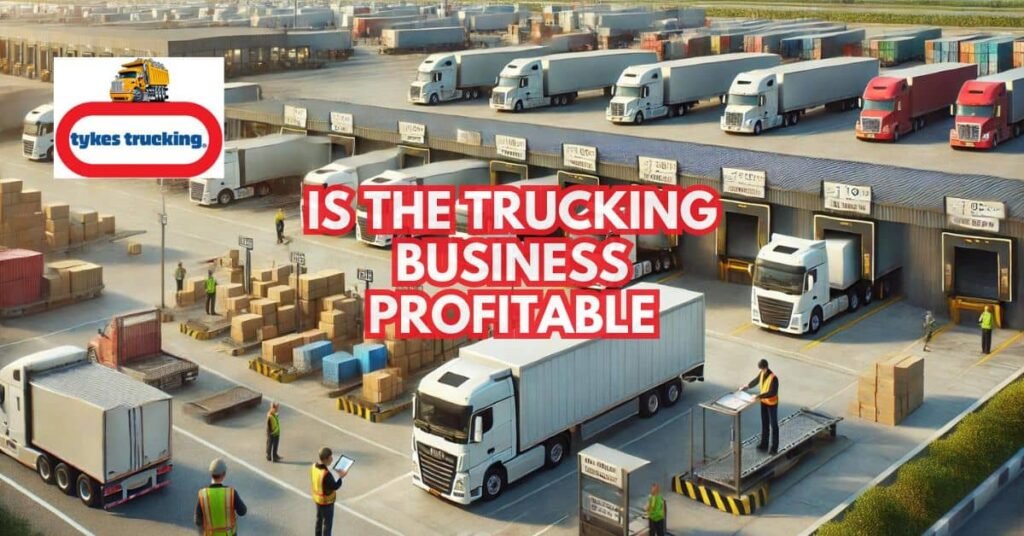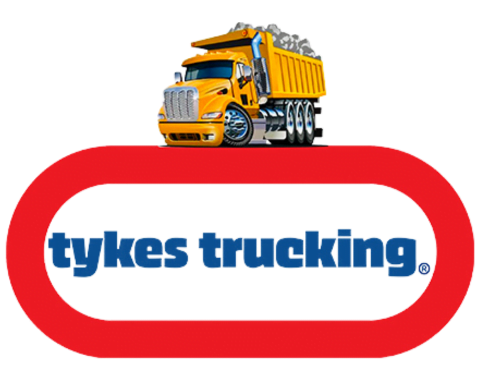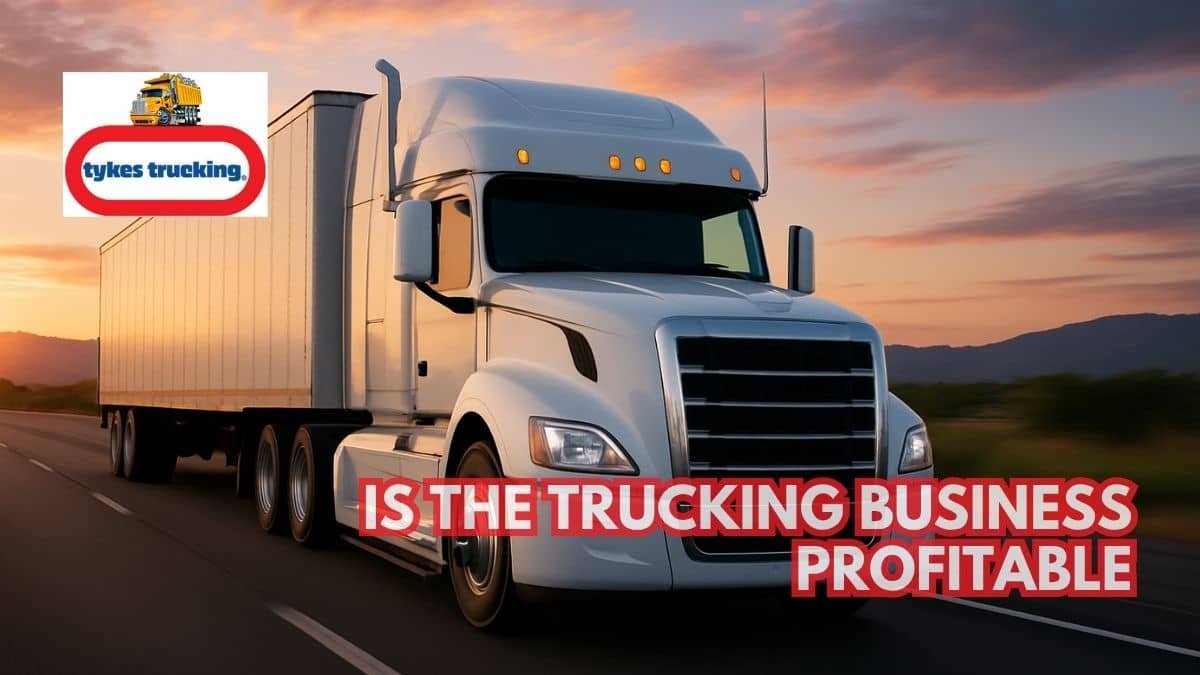The trucking business plays a big role in moving products across the country.
Many people ask, Is the trucking business profitable enough to be worth starting or investing in?
The answer depends on things like how much it costs to run a truck, how many jobs are available, and how well a company is managed.
Trucking companies also deal with changes in fuel prices, driver pay, and rules from the government.
We’ll look at the most important parts of trucking that affect how much money a business can make.
1. Profitability by Niche: Finding Your Lucrative Lane in Trucking
Different niches within trucking can yield varying profit levels, making it crucial to choose the right one.
Specialized services like refrigerated transport, hazardous materials, or oversized loads often command higher rates due to their complexity and demand.
These services require specific equipment and expertise, which can justify higher charges from clients.
On the other hand, general freight may have lower rates but offer more consistent work, providing a steady income stream.
To start a trucking company successfully, it is essential to identify and focus on a niche that aligns with your resources and expertise.
Developing a comprehensive business plan that includes market research and competitive analysis can help pinpoint the most profitable opportunities.
Trucking companies that thoroughly research market demand and competition within different niches can make more informed decisions and maximize their profitability.
🚚 Clean Haul, Smooth Build: Reliable Construction Hauling Services in Marikina
2. How Seasons and the Economy Change Trucking Profits
Trucking companies often earn more during busy times like holidays, harvest season, or back-to-school months because businesses ship more goods.
When the economy slows down or it’s the off-season, there are fewer shipments, so trucking companies may struggle to find work.
This drop in demand can lower freight rates, which reduces how much money a company makes per trip.
A small business in trucking may feel this more because it has fewer trucks and customers to rely on.
These changes can shrink the company’s profit margin, or the difference between what it earns and what it spends.
If payments from clients are delayed, it can also cause cash problems, especially when waiting for an invoice to be paid.
To manage these ups and downs, trucking companies should save money when times are good and plan carefully for slower months.
🚚 Overcoming Any Haul: The Unbeatable Advantages of a Flatbed Truck With Forklift
3. Trucking’s Cost Equation: Breaking Down Operating Expenses
Operating a trucking business means handling many different costs that affect how much profit you can make.
Some expenses, like truck payments, insurance, and office rent, are fixed costs because they stay the same each month.
Others, such as fuel, repairs, and driver wages, are variable costs since they change depending on how far and how often the trucks are used.
It’s important for trucking companies to track both fixed and variable costs closely to avoid overspending.
Managing these costs well helps improve cash flow, which is the money moving in and out of the business.
Good cash flow makes it easier to pay bills on time and handle unexpected expenses.
By reviewing spending regularly and finding ways to lower costs, a trucking business can become more stable and profitable over time.
🚚 Double Trouble: Mastering the Dump Truck with Pup Trailer Combo
4. Fueling Profits and Challenges: Managing Fuel Costs in Trucking
Fuel is one of the largest expenses in the trucking industry, often fluctuating with market conditions, posing significant challenges for trucking business owners.
To run a trucking business profitably, it is crucial to implement fuel management strategies that help control these costs.
Techniques such as optimizing routes to reduce mileage, using fuel-efficient vehicles, and training truckers in fuel-saving driving practices can be highly effective.
Additionally, leveraging fuel cards and bulk fuel purchases can provide significant cost savings, making fuel expenses more predictable.
Trucking business owners should also consider using telematics systems to monitor fuel consumption and identify areas for improvement.
By managing fuel costs effectively, trucking companies can maintain their profitability despite market fluctuations.
Careful fuel management is essential for anyone looking to run a trucking business successfully.
🚚 Why Choose a Single-Axle Kenworth Dump Truck for Medium-Duty Hauling?

5. Keeping Your Fleet Rolling: Maintenance and Insurance Considerations
Regular maintenance of trucks is essential to prevent costly breakdowns and ensure safety.
Scheduled maintenance includes oil changes, tire checks, and brake inspections.
In addition to maintenance, insurance is a significant expense that protects against accidents and liabilities.
Comprehensive insurance coverage is mandatory and varies based on the type of cargo and routes.
Properly managing maintenance schedules and insurance policies can help avoid unexpected costs and keep the fleet operational.
🚚 Why Dump Truck Haulers in Montalban Are Essential for Construction and Waste Management Projects
6. The Driver Factor: How Wages and Availability Impact Profits
Truck drivers are crucial to the success of a trucking business, but their wages represent a major expense that directly impacts net profit.
The shortage of skilled drivers in the industry can drive up wages, leading to higher costs per truck and affecting overall profitability.
Offering competitive wages and benefits is necessary to attract and retain qualified drivers, ensuring smooth operations.
Furthermore, driver availability directly affects delivery schedules and customer satisfaction, influencing revenue per mile.
Balancing fair compensation with profitability requires strategic planning and efficient management of resources.
Trucking companies need to optimize their operations to ensure that higher wages do not erode their net profit.
By managing driver wages effectively, businesses can maintain a healthy balance between costs and revenue per mile, leading to sustainable profitability.
🚚 What Factors Should You Consider When Choosing PTO Pumps For Dump Trucks?
7. Negotiating Your Way to Success: The Importance of Freight Rates
Freight rates are a critical component of a trucking business’s revenue.
Successfully negotiating higher rates with shippers and brokers can significantly enhance profitability.
Building strong relationships with clients and understanding market trends are key to negotiating favorable rates.
It’s important to factor in operating costs when setting rates to ensure they cover expenses and generate profit.
Consistent negotiation and market awareness are essential for maintaining a profitable trucking business.
🚚 Why Choose a Single-Axle Peterbilt Dump Truck for Small to Medium Hauling Jobs?
8. One Truck or a Fleet? The Profitability Considerations
Deciding between operating a single truck or expanding to a fleet involves careful consideration of costs and benefits.
A single truck has a lower initial investment, simpler management, but limited earning potential.
Expanding a fleet increases revenue opportunities but also comes with higher operational complexity and expenses.
Fleet management requires additional drivers, maintenance, and administrative support.
Evaluating the financial and logistical implications of each option is crucial for making a profitable decision.
🚚 Why Sterling Dump Trucks Are Still Valued in the Dump Truck Industry Today
9. Tech for Efficiency: How Technology Boosts Trucking Profits
Incorporating technology into trucking operations can significantly enhance efficiency and profitability.
GPS tracking and route optimization software help reduce fuel consumption and delivery times.
Electronic logging devices (ELDs) ensure compliance with regulations and improve record-keeping accuracy.
Moreover, fleet management software streamlines maintenance schedules and administrative tasks.
Investing in the right technology can lead to cost savings and increased operational efficiency, boosting overall profits.
🚚 Why Terex Dump Trucks Are the Preferred Choice for Heavy-Duty Hauling in Cold Climates
10. Trucking’s Regulatory Landscape: How Regulations Impact Profitability
The trucking industry is heavily regulated, with rules covering safety, environmental standards, and working hours.
Compliance with these regulations can be costly, but it is essential to avoid fines and legal issues.
Staying informed about changes in regulations and implementing compliance measures can help maintain smooth operations.
Plus, understanding regulations can open opportunities for specialized services that require specific certifications.
Navigating the regulatory landscape effectively is crucial for sustaining profitability in trucking.
🚚 Why Should You Choose Super 10 Dump Trucks for Mining and Earthmoving Projects?
11. Trucking’s Future Outlook: Will Profitability Hold Steady?
The future of the trucking industry is influenced by trends like autonomous vehicles, alternative fuels, and changing consumer demands.
Autonomous technology has the potential to reduce labor costs and increase efficiency, but its widespread adoption is still years away.
Alternative fuels like electricity and hydrogen offer long-term cost savings and environmental benefits.
Staying ahead of these trends and adapting business strategies accordingly is vital for future profitability.
Continuous innovation and market adaptation will determine the long-term success of trucking businesses.
🚚 Reliable Dump Truck Rentals in Marikina City
💡 Conclusion
The profitability of a trucking business depends on multiple interconnected factors.
Efficient cost management, strategic niche selection, and staying abreast of technological and regulatory changes are essential.
Understanding market dynamics and negotiating favorable freight rates also play a crucial role.
With careful planning and informed decision-making, the trucking business can be profitable.
Assessing these factors comprehensively helps in building a sustainable and profitable trucking operation.
😉 Our Services
Tykes Trucking Services offers reliable delivery of aggregates and professional hauling services.
Our team ensures the timely and efficient transport of materials to meet your project needs.
Contact us today at 09175435019 for prompt service.
You can also reach us through our Facebook page or the contact form on our website.
Trust Tykes Trucking for all your aggregate delivery and hauling requirements.

